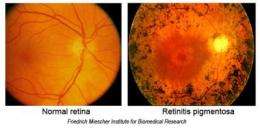Researchers look to the future for defeating blindness

Neurobiologists funded by the Office of Naval Research (ONR) have discovered a potential cure for degenerative vision diseases leading to terminal blindness.
The solution, however, may be rooted in an unconventional therapeutic approach.
Scientists at the Friedrich Miescher Institute for Biomedical Research in Basel, Switzerland, are manipulating the proteins that cause blindness in mice. The scientists have successfully restored vision in the light-sensing cells of the retina.
Dr. Thomas McKenna, program officer for ONR's Neural Computation Program, said this research has significant future implications.
"In the course of their study, these researchers discovered an approach to restore vision in blind mice with congenital macular degeneration," McKenna said. "This technology shows great promise for the partial restoration of vision for blind patients."
This initiative, supported by ONR Global's Naval International Cooperative Opportunities in Science and Technology Program (NICOP), studies retinitis pigmentosa, the incurable genetic eye disease, which causes more than 2 million worldwide cases of tunnel vision and night blindness. If left untreated, the disease can lead to complete blindness as the color-sensing cells in the retina slowly degenerate.
Dr. Clay Stewart, technical director, ONR Global, explained the importance of the NICOP program for providing a platform for innovative international basic research that could ultimately have a profound impact on naval activities.
"The NICOP grants are of a seedling nature and are aimed at maturing foreign science and technology projects to the point that they can be picked up by ONR or other [Naval Research Enterprise] organizations," Stewart said. "In the case at hand, this world-class cognitive research team has developed science that has the potential of being useful in restoration of visual acuity in subjects with impaired vision, such as Sailors or Marines who have sustained head injuries in combat."
McKenna, a recipient of the 2009 Delores M. Etter Top Scientists and Engineers of the Year award, said additional studies are needed before making the treatment available to visually challenged populations. Next, the team plans to explore the duration of therapeutic effects and whether the gene therapy could have applications for other eye diseases.

















